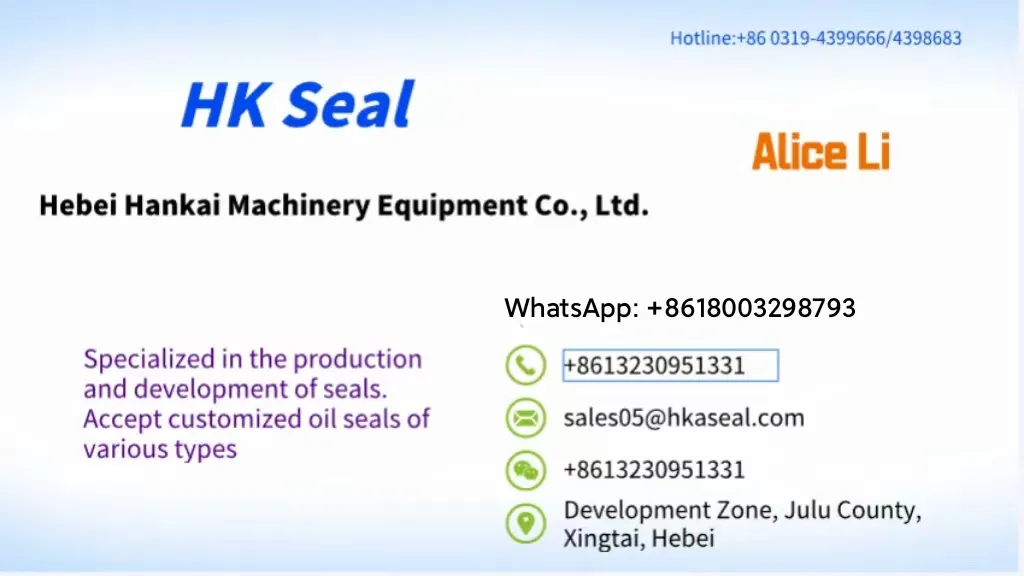ធ្នូ . 09, 2024 22:53 Back to list
A Comprehensive Guide to Skeleton Oil Seals and Their Applications
Understanding Skeleton Oil Seals An Essential Component in Machinery
Skeleton oil seals are a pivotal component in various machinery and automotive applications, ensuring optimal performance and longevity. These seals not only prevent oil leaks but also protect internal components from contaminants. Let’s delve deeper into what skeleton oil seals are, their construction, working principles, and applications.
What is a Skeleton Oil Seal?
A skeleton oil seal is a type of mechanical seal that is designed to retain lubrication oils within a mechanism while preventing dirt, dust, and other contaminants from entering. It typically comprises a flexible elastomeric material combined with a metal skeleton, enhancing its strength and durability. This design allows for better adaptability to high-pressure environments and extreme temperatures, making it ideal for various applications.
Construction of Skeleton Oil Seals
The construction of skeleton oil seals generally involves a few key components
1. Metallic Skeleton The metal skeleton provides structural support and enhances the seal's integrity. It is usually made from materials like steel or stainless steel, which are resistant to corrosion and wear.
2. Elastomeric Material The sealing lip is primarily composed of elastomers, such as Nitrile rubber, Silicone rubber, or other synthetic materials. These elastomers can withstand high temperatures and possess excellent chemical resistance, ensuring that the seal can perform under various operating conditions.
3. Sealing Lip The sealing lip of the oil seal is crucial for its functionality. It is designed to create a barrier against fluid leakage while allowing for minimal friction with the rotating surfaces. This aspect ensures the seal can function efficiently without excessive wear.
4. Dust Lip Additionally, many skeleton oil seals come equipped with a dust lip. This extra layer helps to protect the elastomeric sealing lip from the intrusion of dust and dirt particles, further enhancing the seal's longevity.
Working Principles of Skeleton Oil Seals
skeleton oil seal

The primary function of a skeleton oil seal is to maintain a pressure boundary between different components within machinery. When applied, the sealing lip makes contact with the shaft, creating a tight seal that prevents oil from leaking out and dirt from entering.
As the machinery operates, the elastomeric material compresses against the shaft, ensuring continuous contact and an effective seal. This design allows for motion while maintaining pressure integrity. Importantly, the metal skeleton supports the entire assembly, ensuring that the oil seal functions effectively under varying pressures and temperatures.
Applications of Skeleton Oil Seals
Skeleton oil seals find applications in a wide range of industries
1. Automotive Industry These seals are commonly used in engines, transmissions, and differentials to prevent oil leaks, thus maintaining the integrity of the lubricant.
2. Industrial Machinery Skeleton oil seals are essential in hydraulic systems, pumps, and compressors, where they protect against fluid loss and contamination.
3. Aerospace Engineering The aerospace industry requires seals with high performance under extreme conditions. Skeleton oil seals meet these demands, ensuring reliable sealing in aircraft engines and other critical systems.
4. Agriculture Equipment Many farming machines utilize skeleton oil seals to prevent oil leaks, ensuring these machines operate efficiently.
5. Marine Applications In marine environments, seals must contend with exposure to water, salt, and varying temperatures. Skeleton oil seals are suited for marine engines and hydraulic systems, preventing leaks due to harsh conditions.
Conclusion
Skeleton oil seals play a crucial role in maintaining the efficiency and longevity of machines across various industries. Their unique construction, combining a robust metal skeleton with flexible elastomeric materials, provides an effective solution for preventing oil leaks and protecting internal components. Understanding their function and application is essential for engineers and technicians looking to enhance the performance and reliability of machinery. By choosing the right seal for each application, businesses can mitigate downtime, reduce maintenance costs, and ensure a longer lifespan for their equipment. Investing in quality skeleton oil seals is undoubtedly a step towards superior machinery performance.
-
TCN Oil Seal Metal Ring Reinforcement for Heavy Machinery
NewsJul.25,2025
-
Rotary Lip Seal Spring-Loaded Design for High-Speed Applications
NewsJul.25,2025
-
Hydraulic Cylinder Seals Polyurethane Material for High-Impact Jobs
NewsJul.25,2025
-
High Pressure Oil Seal Polyurethane Coating Wear Resistance
NewsJul.25,2025
-
Dust Proof Seal Double Lip Design for Construction Equipment
NewsJul.25,2025
-
Hub Seal Polyurethane Wear Resistance in Agricultural Vehicles
NewsJul.25,2025
-
The Trans-formative Journey of Wheel Hub Oil Seals
NewsJun.06,2025
Products categories
















